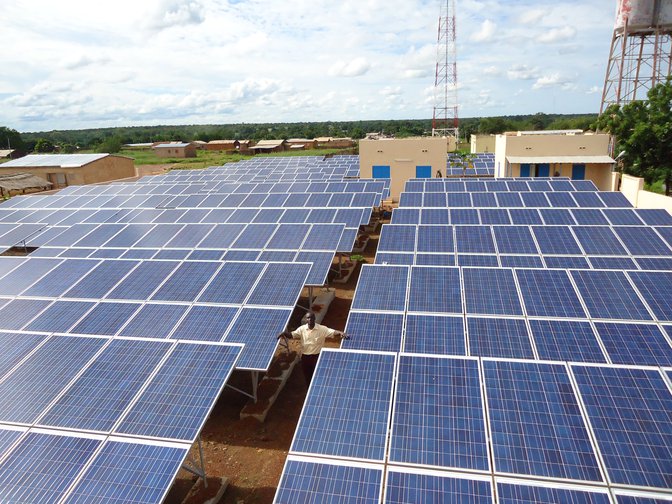With the threat of climate change and coronavirus, decentralized renewable energy could be key to building more resilient food systems.
For sub-Saharan Africa, the negative impact of climate change has made thinking about better farming practices more important than ever. Massive shifts in rainfall patterns over the years have forced countries in this region to be net food importers, meaning that the continent imports more food than it exports. According to the African Development Bank (AfDB), Africa spent USD64.5 billion importing food, and this is projected to rise to over USD110 billion by 2025, should there be no interventions. These commodities, which can be produced on the continent, include rice, beef, soybeans, sugar and wheat, among others.
Europe remains Africa’s top agricultural trade partner but the COVID-19 pandemic led to depressed demand due to financial constraints and shifts in spending patterns. In that light, decentralized renewable energy rollout is becoming a central part of building resilience, scaling agriculture and strengthening food productivity in Africa.
Sunculture - Kenya
Solar powered irrigation allows farmers to unlock existing resources to boost the resilience of their farms that are at the mercy of unpredictable weather patterns. Kenyan-based renewable concern Sunculture operates as a ‘one stop shop’ for clean energy solutions, tailored for smallholder farmers. The company runs a Pay-As-You-Go financing model which lowers financial barriers for renewables ownership.SunCulture provides smallholder farmers with the technology, financing, and services to make their farms smart and more productive today and into the future.
“It’s in our best interest as a business for our systems to be working so that our customers are earning the income to pay us back,” says Sunculture chief of staff Mikayla Czajkowski.
InspiraFarms - Rwanda
Another innovative company making strides in Rwanda’s renewables market is InspiraFarms. The firm provides small and growing agro businesses in the developing world with tools, technology and expertise to reduce food losses, energy costs and access higher value markets. One of the reasons farmers do not have access to the cold chain is because they cannot plug into any cooling solution without access to energy. Furthermore, the absence of cold storage and poor transportation are the main drivers of post-harvest losses (PHL).InspiraFarms then developed off-grid hybrid solutions including solar kits and grid connection in a bid to solve one of the teething issues around bringing the cold chain into the first mile of distribution, particularly close to production points.
“It is very common that the levels of PHL can be higher than 30% as a result of a
combination of factors, but a unifying theme is lack of cold chain infrastructure close enough to harvest points and the time lag in between harvest and first cold chain access. This causes high levels of over-maturation and dehydration, with further impact on quality preventing access to valuable export markets,” InspiraFarms community and client relations manager Paula Rodriguez
South Africa agrophotovoltaic projects
The fusion of agriculture and solar power can boost sustainable development. Integrating solar powerwith agricultural practices can reduce demand for wood energy while creating low carbon economies.
“For example, elevated solar photovoltaic panels are used to shelter crops planted beneath, referred to as agrophotovoltaic projects. This can increase yields while conserving the land space used for solar panels in confined urban spaces” Requier Wait - Senior researcher with the South African-based Institute for Security Studies
South African farmers now have the opportunity to access reliable solar energy, thanks to a partnership between a renewable concern, Jaguar New Energies, and a Dutch government-supported fund. Set-up costs will be covered by the clean energy fund and this will enable farmers to have access to cheaper, clean energy while making a quicker transition to a reliable and consistent power source. Due to these massive green energy rollouts, South African maize production in 2020 is projected to be more than 30% higher than in previous years.
Tanzanian-based mini grid operator JUMEME Rural Power Supply
Tanzanian-based mini grid operator Jumeme, serves as a model that showcases the broad benefits to local communities of investment in renewable energy and fish farming.
Jumeme runs a pilot project that buys fish from local fishermen, processing and freezing them using its own renewable power onsite and then selling the fish to distributors across Tanzania. Fishermen have reaped benefits from this green initiative as they now have access to bigger markets with higher prices in turn.
Jumeme runs a pilot project that buys fish from local fishermen, processing and freezing them using its own renewable power onsite and then selling the fish to distributors across Tanzania. Fishermen have reaped benefits from this green initiative as they now have access to bigger markets with higher prices in turn.
"The use of mini grids could be a solution to farmers’ inability to access pricey solar kits for their farms, especially where farmers are clustered or in reasonable proximity of each other." Jumeme head of sales and marketing Robert Wang’oe
Related:
14 Oct 2020. Call for proposals - Accelerating the green transition and energy access Partnership with Africa!In September 2020, the European Commission launched a €1 billion call for research and innovation projects that respond to the climate crisis and help protect Europe's unique ecosystems and biodiversity. The Horizon 2020-funded European Green Deal Call will spur Europe's recovery from the coronavirus crisis by turning green challenges into innovation opportunities. More information about this can be found in the press release.
The EU Delegation to the African Union is organising a Webinar on the 26th October to answer questions related to this call. To register for a Webinar, please go here: https://eutoau.blumm.it/event/ar/1/evento









No comments:
Post a Comment